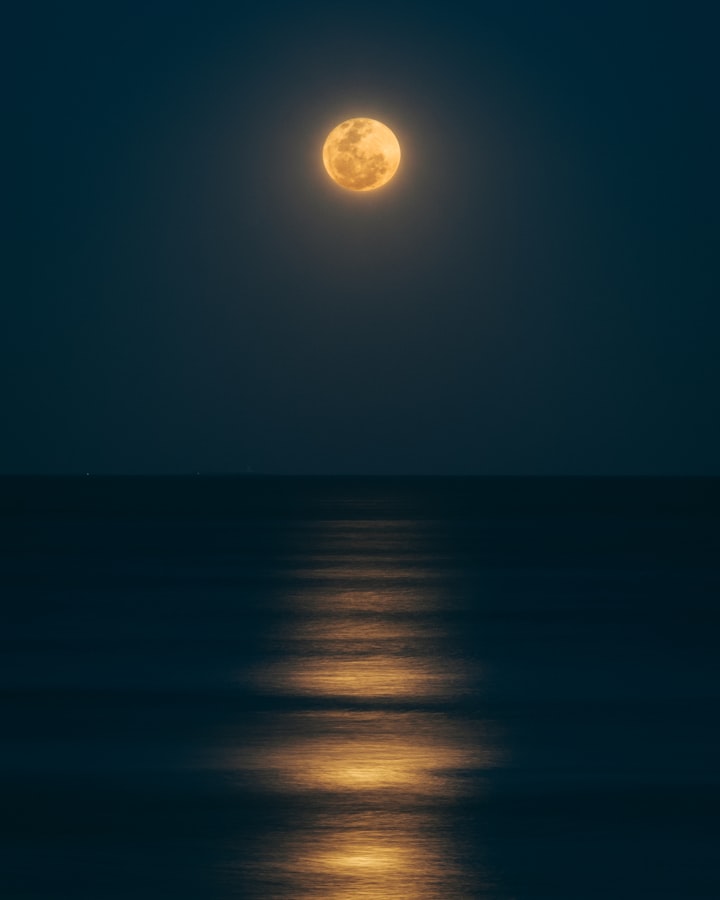Tide Keeping
Moon, man, and a mother between their rise and fall

Rise and fall
I’ve never seen my husband like this.
Usually, he is the calm in chaos, the shrug at the seventh red light in a row. This is new: his voice at this odd pitch, quivering between height of panic and depth of despair.
I see him yell so loud, the veins protrude from his neck.
Somebody help me, he cries. But there is no-one.
His hands rise to reach; they lose grip.
Me. I realize. He’s reaching for me.
He’s like the heave and ho of waves in a storm. His hands are on my chest, desperate, forceful, pushing, pushing. I must be broken if he is trying to fix me. He tries to make me do something I am not likely to do: come back.
A bead of his sweat lands on my temple: maybe a tear?
I’ve never seen one of his before. Our wedding, the birth of two children, two grandparents killed in a plane crash. Not a single tear.
But now? His face is distorted, blurring slowly as I feel my hands grow cool. My toes, cold as the place at the bottom of the sheets.
I begin to separate: my self from myself. As if someone is cutting the threads between my body and soul one by one. I become heavier and lighter at the same time as the distance between me grows.
The kids, a thought whispers, then blows away. I’m the one who’s always here. He’s the one who leaves. I’m the one they all come back to.
But I sense the weight of my own body melt away.
There’s a sound like water, or wind, rushing through my head, getting louder and louder, whiter and whiter: like a sheet on a breeze, a seed from a dandelion, sun through a window.
I’m leaving.
“Mommy?”
Wait.
From down a tunnel, like an echo, I hear her.
Wait.
For a second, stillness. And then...
Like whiplash, I am yanked back, sucked forcefully through a passage I didn’t know I traveled through. Ripped down, or up, through hot, thrashing currents, thick and heavy, stifling, as the white fades, her voice returns, louder and louder, closer and closer, until I see her.
The air burns, searing my lungs. It ravages me, tearing me in half, top to bottom with its fire, in a single gasp.
The pain screams, maybe I do too; I’m not sure, but I feel it.
“Mommy?”
I’m back.
Takeoff
“Clear!” my husband calls.
Everything rumbles, then churns to life.
I revel in the familiar vibrations coursing through my limbs, the way the air wraps around me, brushes my face, flashing, breaking. The chill of the fading night fights the engine’s heat, the propeller whirs awake.
Mere seconds after coughing up enough water to stabilize, my husband had tossed me into the Cessna 185, piled the kids in, and got moving. Already, our trailer had been swallowed, the water swell exceeding our projections, complete with rip currents I’d almost been no match for.
We pick up speed, the force of it, like my body leaving without me. What remains of the grass becomes brown streaks in my peripherals. The wheels let go of the ground right as day breaks.
I muster strength to prop myself up, peer through the window to see water swallow the runway, choppy and hungry from its climb up the hill that nearly stole my life. Now it steals my breath again as my eyes try to process the scene, blinking repeatedly, part from blurriness, part from disbelief. They sting with saltwater. Is it mine or the sea’s?
How can something so devastating be so beautiful?
I take stock of the children, tucked around me in sopping-wet clothes. Too benevolent to anticipate what may come next, they are silent. I am here. They cling to me, the five-year-old tracing hearts on my stomach, the three-year-old, falling asleep. Her head spills curls of gold against the dark of me.
My husband cranes his neck around, keeping the plane steady, meeting my eyes.
I’m okay, I mouth. He smiles wanly, reaches an arm back to squeeze my knee, returns his gaze forward.
“I have enough fuel if we can reach another range within the next few hours,” he says. “The tide should be low enough in a couple of days to find more and head back.”
But I fear our little mountain home is long-gone. The landscape is endless ocean in every direction.
You might see a church steeple by and by, just a cross above the risen water like a cake topper, a satirical beacon of faith-keeping in a world we were promised would never flood again.
Now look at it.
How could anything be left?
We had been living off the grid since the tide floods began a few years ago: him, a pilot, and me, mothering and teaching our girls, Emma and Grace. By pure luck, we'd purchased and parked a trailer on undeveloped property in Stehekin two years ago, with the intention of starting a ranch once normal times returned.
As the tide rose and fell, we’d mark its patterns and move to higher elevation before each major rise. Before long, we sat on land we didn’t own, but which lacked anyone to police it. We’d gather supplies when we could during low tide, and continue our climb when it rose again. We were living simply as a family, falling asleep at night with prayers for the moon’s gradual retreat escaping our lips.
It was a night such as this when I had awoken to the sound of water.
It was peaceful. Gentle like the white noise machine we used in the girls’ nursery at bedtime. Unassuming, it had worked its way into my dreams, and my head was filled with images of napping seaside, sipping a drink, sun on my face. The water, lapping against my toes; it felt so real.
But then I felt it against my back. My shoulders. My ears.
I had shot up in bed, suddenly wide awake in a nightmare.
“Darren!”
I had shaken my husband from his bear-like hibernation, water splashing as he tore awake, gasping. We had leapt from the bed, thrashing and wading through our belongings, all afloat, to the girls’ room. I had almost cried with relief in discovering the water still just below their raised beds, scooping them up swiftly amidst the muffled, sleepy murmurs of their confusion.
Moving as fast as we could through the hip-deep water, out of the trailer, we had made a beeline to the plane, just a ways uphill. By the light of what remained of the giant moon, we could tell it wouldn’t be long before the plane would be up on its floats.
The water had begun fighting back against my steps, hurricaning around my legs in tight currents.
“You’re going to have to take her,” I had said, out of breath. “It’s too strong for me. I need my arms.”
Darren had stopped long enough for me to hand Grace to him, while I lagged behind. And just as I saw his foot make landfall near the gravel runway, a violent current ripped my legs out from under me.
As far as I can recall, my next few breaths were of water, my memory narrowly escaping me, to return only in those final moments before I’d come back: when I’d heard my daughters calling for me.
And now, here we are, as sure as I breathe air.
Halfway between water and infinite sky:
The closest a human can come to being two places at once.
New heights
The sun is rising warmly by the time Darren finds a spot high and clear enough to put the plane down. We’ve seen no traffic up here, which surprises me; we can’t be the only ones with a set of wings and the same idea, but here we are. The mountain looks like Neverland, surrounded by shimmering waves.
Our disheveled crew unloads, setting out for a place to rest and find water. We don’t even have shoes, but hike for an hour and a half until we reach a small house, hidden by shadows of ancient pines. Its path has been cleared no more recently than several weeks ago, it appears.
No one answers our knock, so Darren locates a poorly hidden key to let us in. Not a creature stirs within. A “life is better at the cabin” sign hangs in the entryway amongst faded pictures of a kind-looking elderly couple proudly holding fish up to the camera.
Darren motions up some steps to a small loft where we lay the girls down.
“I’m thirsty,” whispers Emma, the oldest.
“I’ll find you water,” I say, stroking her hair. She lays back down to wait.
“I’m going to see if anyone else is up here,” Darren whispers. “You should rest.”
“I’ll try,” I reply. I only half mean it.
But once glasses of water have been delivered to the girls, I lay wide awake. If I doze, I shoot upright, gasping for air, reliving drowning.
So I give up, dig an old wool sweater from the closet to hug around myself, locate a pair of leather boots only a little too big, and step outside. Frost covers the ground: October, crystallized. Leaves of all colors, sugared, sparkling with what remains of morning.
Before our recent nomadic living patterns, I never had quiet. One of the girls would end up in our bed, tangles of feet and blonde hair, elbow jabs, and too-hot cuddles. At least one would be up before the sun, so we never made it much farther than the coffee pot before 8 a.m.
But as they’ve kept our unpredictable hours, governed by the sun and moon, tides and trauma, they find the deepest sleep: I have solitude. Although, alone with my thoughts is not always a place I want to be.
As I walk, the pine needles crunch and sticks crack, the only sound for miles. It seems even the birds have gone. I look up.
Where have you gone? Can I go, too?
My eyes scan the tree line, searching for movement: a mouse, a rabbit, a deer, anything.
“Hello?” I whisper.
Only frosty grass in a breeze whispers back.
Even with the sun risen, the moon’s giant face watches me wander. His expression seems to offer an apology for being too close. He never meant any harm.
They can’t explain the shift, or precisely when or for how long it had been happening. There had been a tug of war between sun and moon, set off by God-knows-what, and we got as many as 257,431 miles closer to the sun during the perihelion of 2023. It was enough to do away with much of earth’s remaining ice, raising sea levels by roughly 122 feet worldwide.
Even when we began to pull away from the sun again, we got stuck in a closer dance with the moon. It came 5 times closer, then 10 times closer, and we didn’t track it beyond that; we were too busy fleeing the tides, which had wiped out at least 3.7 billion people so far, by rough estimates (the only kind possible).
There was nothing to be done. There was acceptance.
Ducking beneath the low branches, I head towards what looks to be a small, babbling creek.
Water I don’t need to run from.
Thin, dewy spiderwebs get caught in my hair, on my sleeves as I press on. They sparkle. I spit a few from my lips.
One remains between me and the creek, on a low branch, its strands thicker than the others.
I reach out to grab it, swipe it away, and the twig snaps, the cold web tangled in my fingers.
I think I’ve grabbed the spider, too, in this swoop.
But when I open my hand, there is no spider.
Trapped against my palm is a tiny silver locket.
About the Creator
Sarah Graybill
Sarah writes prose, poetry, and realistic fiction grappling the human experience in tangible micro-moments that stir the soul. A mom of 3, she hopes to publish her first book as tribute to her father, who passed away suddenly in January.
Enjoyed the story? Support the Creator.
Subscribe for free to receive all their stories in your feed. You could also pledge your support or give them a one-off tip, letting them know you appreciate their work.






Comments
There are no comments for this story
Be the first to respond and start the conversation.